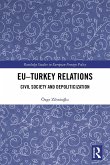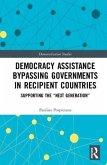EU external democracy promotion has traditionally been based on 'linkage', i.e. bottom-up support for democratic forces in third countries, and 'leverage', i.e. the top-down inducement of political elites towards democratic reforms through political conditionality. The advent of the European Neighbourhood Policy and new forms of association have introduced a new, third model of democracy promotion which rests in functional cooperation between administrations. This volume comparatively defines and assesses these three models of external democracy promotion in the EU's relations with its eastern and southern neighbours. It argues that while 'linkage' has hitherto failed to produce tangible outcomes, and the success of 'leverage' has basically been tied to an EU membership perspective, the 'governance' model of democracy promotion bears greater potential beyond the circle of candidate countries. This third approach, while not tackling the core institutions of the political system as such, but rather promoting transparency, accountability, and participation at the level of state administration, may turn out to remain the EU's most tangible form of democratic governance promotion in the future. This book was originally published as a special issue of Democratization.
This book defines and examines the three principal strategies of EU democracy promotion in comparative analyses of Eastern European and Arab countries in its neighbourhood and thereby specifies the conditions under which EU democracy promotion is likely to be effective and how. This book was originally published as a special issue of Democratization.
This book defines and examines the three principal strategies of EU democracy promotion in comparative analyses of Eastern European and Arab countries in its neighbourhood and thereby specifies the conditions under which EU democracy promotion is likely to be effective and how. This book was originally published as a special issue of Democratization.








